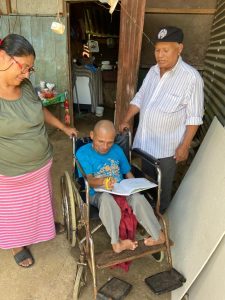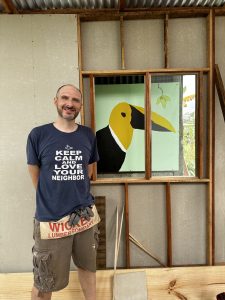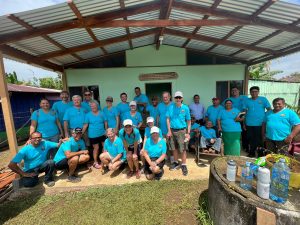
Smash Your Isolation
March 12, 2023
It starts by a well.
Jesus strikes up a conversation with a Samaritan woman by a well.[1] It is noon, and she isn’t expecting anyone to be there. Let alone this foreigner. How does she know he isn’t from around here? His accent? Darker skin tone? His manner of dress?
The disciples are away, and Jesus strikes up a conversation about living water with this Samaritan woman by a well. She talks about water; Jesus talks about living water and never being thirsty again. She asks good questions and is no shrinking violet. In her assertiveness, Jesus blesses her by revealing that he is the Messiah.
We pick up on this story with the disciples returning and trying to figure out what has transpired. The disciples arrive and silently wonder what’s going on just as the woman leaves. She leaves her water jar, her entire purpose of going to the well in the first place, and heads back to the city and tells everyone! “Come and see a man who told me everything I have ever done! He can’t be the Messiah, can he?” The whole community then heads to the well to see about this Jesus guy.
Meanwhile, his disciples urge Jesus to eat. Jesus does the same thing with food as he did with the water. “My food is the will of God. Look at all this food! I’m harvesting and gathering fruit for eternal life! I sent you to reap that for which you did not labor. Others have labored, and you have entered into their labor.”
Oh, Cryptic Christ. What on earth are you talking about? I think he is giving a nod to three things. First, I think this passage says a lot about Jesus and his relationship with God and with us. Second, I think it says a lot about being a disciple. And third, I think it proves a certain truth about us that we are reluctant to admit.
First, Jesus and his relationship with God. I love the parables, and Jesus here references two. The first is the parable of the sower, which is not found in John, but in all three Synoptic Gospels: Matthew, Mark, and Luke.[2] God is the sower who just throws seeds out willy-nilly. God casts the seeds on every type of soil, and the world is full of the seeds of the kingdom. When they land on different soils, some are stolen by birds. Some sprout quickly but burn out. Some that fall on good soil give an amazing harvest double, triple, or six-times the normal yield.
God is the sower. Jesus is the reaper here in John. God was at work long before Jesus got there. Jesus is receiving wages, meaning collecting followers like the disciples, like the Samaritan woman at the well, and soon this whole Samaritan city. Jesus is always in community. When the disciples leave, instead of eating, Jesus creates more community with complete strangers. I think Jesus is that guy you meet in an airport or elevator, who just strikes up a conversation. It’s a little shocking at first, but then you feel glad when you leave. I kind of hate those interactions at first because they’re so awkward. I’m task driven, I just want to do what I came to do, yet I’ve come to welcome these interruptions as this is often how God and Jesus work.
Jesus then says, “I sent you to reap…” and the disciples are joined as equals in the work recalling the phrases, “These things I can do, you can do and greater than these…” John 14:12 and “I no longer call you servants but friends” from John 15:15. We are engaged in work that has already started. God has been at work: through tradition, through the law and prophets, and all the saints of our scared stories and lives. We didn’t start this. Our ancestors built this building and we’re trying to keep it standing. We didn’t create the idea of Lent… we’ve engaged in the work that we’ve inherited. I think this has a lot to say about what it means to be a disciple, our second topic. I’m reminded of the parable of the laborers.
The parable of the laborers, also known as the parable of the generous employer, is about being a disciple. It’s only found in Matthew 20:1-16. It’s about a manager who hires folks at different times of the day and then at the end of the day, they are all paid the same thing. The folks who have been working longer complain about getting paid the same amount as those who just arrived. To which the manager says, “Am I not allowed to do what I choose with what belongs to me? Or are you envious because I am generous?’ So the last will be first, and the first will be last.”
The parable has a lot to say about our second topic: being a disciple. The parable has often been interpreted to mean that those who are converted early shouldn’t be jealous of those who are converted later. It could be a historical reference that the Jewish followers of Jesus should not resent the Gentile followers. It could mean that those of us who have been in church all our lives and maybe take it for granted a little bit, shouldn’t scoff at those who found Jesus later on and are more enthusiastic, emotional, or energetic about it.
Instead of scoffing, we could choose to celebrate with them. I’ve often found that when someone discovers something I like, I can become a gatekeeper. Gate keeping was big in the punk movement. There’s a concern about insiders and outsiders: Are you a real punk, are you just a poser?
The epicenter of this community in the mid-1980s was 924 Gilman Street in Berkeley, California. In the music scene in that area, there was a lot violence and alcohol. The founders of Gilman wanted a safe environment and a sense of collective responsibility. Their rules were straightforward: “In order not to be closed down by local police, we have rules: No, racism, sexism, homophobia, alcohol, drugs, fighting, and no dogs. They explained only the last one: “Not because we hate dogs, we love dogs but loud music hurts their ears.”
This area launched the huge punk revival in the early 90s. When these bands hit big, a new rule was added. In the wake of Green Day signing to a major label and making an album that went on to sell 10 million copies the community at Gilman added the rule: NO MAJOR LABEL BANDS.
They excommunicated the most popular band instead of celebrating them. I think the church can be like that. Often, we act like the older brother. There’s a celebration going on for our younger, wayward sibling thrown by our Heavenly Parent, and instead of dancing for joy, we complain. Instead of welcoming and loving and serving along those new to the faith, sometimes we complain.
In my last church, we once had a class that had 25 new members; most of whom were young families. Right after what I thought was an amazing service and a wonderful day, I saw a longtime member standing stock-still with a stricken look on her face. When I asked what’s wrong, she replied, “What happens to me now that they’re here?”
With all the new members and visitors among us, maybe we’ve been tempted to ask this same question. My answer remains the same: “Well, you get to celebrate and make new friends and enjoy the new member cake at coffee hour! Let’s go party and welcome! Because they wouldn’t be here if they didn’t find meaning and community, and you’re a big reason for that!”
I still stand by that answer. No need to get huffy that new people have joined us, it means they like you and want to learn more and engage in the work we’re doing! Why be gatekeepers? Jesus is not interested in gatekeeping. The disciples might be, but Jesus isn’t. Jesus is interested in doing the will of God. He’ll hang out with all sorts of people to bring in this harvest of good things God has been working to bring about. Others have labored, and you have entered into their labor. Thanks be to God, right?!
Which brings me to our third topic: the uncomfortable truth we are hesitant to admit. We are often isolated. We are proud and we like to think of ourselves as self-sufficient individuals. Yet we are because others were.
We were not hatched from an egg we laid ourselves. We are, as Irish poet Padraig O Tuama writes, “A fusion of a sperm and an egg of two people who once were strangers and may well still be.”[3] From our conception, we are a group project. We were formed by our families or lack thereof. We find ourselves part of a story that is already in progress. We did not make ourselves. We are a group project. Yes, we are individuals with agency, but we have been formed by communities. Our family, our mentors, our teachers, our society, this is English I’m speaking and writing in because if I did, “tear” and “tear” would be spelled totally differently. We are a equation that is complex. We are a group project.
And we built a house. It started by a well. Your previous pastor, the Rev. Dr. Neil Sadler met Maximo, the head of Mercy Homes Ministries, many years ago. Our church has now built somewhere in the vicinity of 22 homes in Costa Rica. Maximo and his ministry has built somewhere in the vicinity of 207 homes total. It’s a great program. When Vicki Miller and Tammie McGivern asked me to go, and when later Judy and Kent Daugherty added their peer pressure to me, I answered, “Well, maybe when I’m done with my doctorate.”
It started by a well. I shouldn’t have been surprised that when I showed up at the jobsite last week, Maximo started the tour of the jobsite by an actual well. He said, “I wish I could move this well now that the family is connected to city water.” I said, “No, it’s perfect.”
 God was moving. God was moving long before our team got there. God was moving in the heart of Maximo to start his ministry to build homes for families in his beloved country. God was moving in the heart of the family whose home we built. Marta, Luis, and Lucito and their sons. They could have been proud and not asked for help. They could have suffered and made due with their own house they built, which was good and served their purpose, but was just sufficient. A tin roofed shack with hanging electrical wires in dim and dingy rooms.
God was moving. God was moving long before our team got there. God was moving in the heart of Maximo to start his ministry to build homes for families in his beloved country. God was moving in the heart of the family whose home we built. Marta, Luis, and Lucito and their sons. They could have been proud and not asked for help. They could have suffered and made due with their own house they built, which was good and served their purpose, but was just sufficient. A tin roofed shack with hanging electrical wires in dim and dingy rooms.
Instead, they decided to be vulnerable and smash their isolation. They asked for help. Strangers showed up. Strangers who could have stayed home. Yet instead, we traveled to a foreign country and built a home for complete strangers. Community was found. I thank God for this mission trip. It was life changing and God showed up everywhere. We were saturated by Jesus each step of the way. The Spirit stirred with our group and our family and building crew. Thanks be to God who made us all unique and diverse, yet similar enough to find connection. We didn’t speak each other’s language. There was a lot of translation needed. Yet love and community and connection pour forth.
When we were building the panels on the first day, a yellow-throated toucan landed in an orange tree. It was a holy moment. On the second day, Maximo wanted some art added to the house. First, he asked for a palm tree to go around a door frame. Judy and I knocked that out. Then he asked for another picture. I thought of the toucan. I painted this and gave it two intentional religious symbols and one unintentional (we’ll call it a God-wink).
 1. The Holy Spirit is depicted as a dove often. Who’s to say that she’s not a toucan in Costa Rica. A toucan visited us while building the panels, I took it as a sign that God was with us.
1. The Holy Spirit is depicted as a dove often. Who’s to say that she’s not a toucan in Costa Rica. A toucan visited us while building the panels, I took it as a sign that God was with us.
2. The three leaves represent the Trinity and the two oranges represent the dual-nature of Christ: fully divine and fully human.
Those were the intentional meanings I put in the painting… Yet God showed up again in an unintentional third way.
3. The call of this bird is transcribed as “Díos te dé te dé”, which translates from Spanish as “God give you”. God give you a house. God give you a mission. God give you connection across language, race, national borders for God cares not for such distinctions. I still get goosebumps.
A feast was set for us. This is food that will keep me fed in the spiritual lean times. And you were with us each step of the way. Your tithes and offerings to the mission team sent a group of 12 down. Most were related to our church whether an active member or former members who moved to warmer environments. And Kate and I got to go. You provided a home to complete strangers in Costa Rica. You helped a family see their son in a new way. You provided a medical lift that will save the back of Marta who has been lifting Lucito for 30 years.
We did this. It was a group project. We are a community founded on the relationship between God and Jesus. We are disciples engaged in the work that others have started. Maybe the Samaritan woman at the well started building affordable homes in her city. Like Meghan last week, I’m being poetic. We are ancestors to the 12 disciples as well as that Samaritan city who came to believe because of the woman’s testimony. We are a group project. We are never alone in this work.
Smash your isolation. If you have a question, ask it. It will be taken seriously. If you have doubts, name them, and you’ll find guidance. If you need help. If you need fed physically, spiritually, or emotionally, speak your truth. And you will be fed.
Our late friend Josh Olin whom I’m still mourning often told his high school students, “Don’t be an island.” I give his wisdom to you. There is community here. You’ll find here a well of living water. You’ll find here a table set before you, and your cup overflows. God has been so good to us. God is so good to us. Even when life gets hard and impossible, we have community who can carry us if we but say the words. SAY THE WORDS friends. Together, my friends. Together. Thanks be to God. Amen.
Works Cited
[1] Check out the Rev. Meghan Malone’s amazing candidate sermon from September 2022 on this interaction: https://www.uccmedina.org/sermons/will-you-give-me-a-drink/
[2] See Matthew 13, Mark 4, and Luke 8 for the parable of the sower in the synoptics.
[3] The Facts of Life, from Sorry for your Troubles. Canterbury Press, Norwich, UK. 2013. Page 7.



Good to hear the report of your trip and how you experienced community. I’m going to borrow the quote you used from the poet Padraig O Tuama and pass it along to those on my mailing lists. We need to get together and get our minister’s group back on track. George